Elspeth Cooper's Blog, page 13
March 3, 2011
What's this? What's this?
I can't believe my eyes – I must be dreaming… — Jack Skellington
 A parcel just arrived here at Cooper Towers. A thick, heavy parcel, bound in sticky tape and bearing the blazon of none other than Orion Books.
A parcel just arrived here at Cooper Towers. A thick, heavy parcel, bound in sticky tape and bearing the blazon of none other than Orion Books.
So, naturally, I opened it – or tried to. Application of fingernails, scissors and finally brute strength was required (I don't know where Orion gets their Sellotape, but this is definitely not regulation Sellotape, being fiendishly sticky and stubbornly durable).
Eventually, the ungodly stuff was overcome, and the parcel disgorged this:
 Yup, the page proofs for Songs of the Earth just thudded onto my desk. Ooh. Exciting.
Yup, the page proofs for Songs of the Earth just thudded onto my desk. Ooh. Exciting.
Now I get to read my book for the umpteenth time, looking for errors, misspellings, infelicitous word-choices etc – though hopefully I've already eliminated most of the outright clunkers by now, leaving only my prose, to stand or fall on its own merits.
It looks lovely, by the way. Absolutely lovely, like a child in its christening robes, all white and perfect. Sniffle.
Sorry, I seem to have got something in my eye.
There's white things in the air — Jack Skellington
February 25, 2011
Is this a proof I see before me?
It bloody well is, you know.
Songs of the Earth is now manifest in physical form, and doesn't it look pretty, all shiny and clean, ready to be launched into the big bad world to be variously picked apart, analysed, sneered at, reviewed, raved about, blogged over and ignored. Gulp.
I feel like a mother on Junior's first day of school. Proud, and slightly nervous, smiling brightly and waving goodbye with an emergency hankie or two stuffed up my sleeve.
Actually, scratch that. Junior's got rather more to worry about than a wedgie and having his lunch money stolen. Some of those reviewers can be downright merciless; it would be an entirely fitting allusion to say I feel like a gladiator's mum before his first bout, having just walked through the armoury and past the wild-animal enclosure with the screams from the infirmary ringing in my ears.
Still, I've done my best, and he's on his own now. I'll be proud of him whatever happens. Go get 'em, kid.
Cover art, part II
It's been a long road to get here. Two different artists, neither quite capturing what the publishers were looking for, designers being admitted to hospital – you couldn't make it up.
But here it is, as close to final as I've got. There's still a teensy bit of smoothing-out and finessing to do, but imagine, if you will, matte gold foil on the title, and a spot-UV treatment on the twiddly bits to make them shine in the light, and you have it.
Ladies and gentlemen, I give you the UK cover for Songs of the Earth:
Ain't it pretty? You can click on it to make it bigger. Go on, you know you want to.
January 17, 2011
Cover art, part I
 So the first of the cover art is in – and from Spain, no less.
So the first of the cover art is in – and from Spain, no less.
It's not a scene I would have chosen from the book, I admit, but it makes a damn fine cover nonetheless. Apparently this is a very commercial treatment, in the Spanish market.
The title translates as "Under the Ivy". Click on the image to see it in all its 2.5Mb loveliness. Muy bonita, no?
Rumour has it there may be a Part II to this post at the end of the week, when the UK cover art is in. Rest assured I will be sharing it with you just as soon as I can.
January 12, 2011
To e-read, or not to e-read?
I have been a strident advocate of real books, but Amazon's relentless Christmas advertising campaign got to me, and convinced me that I needed a Kindle – even though I didn't actually want one. Add that to my Christmas loot burning a hole in my pocket, and the result was inevitable.
I have to say, it's impressed me. Beautifully engineered, it is light, readable, vastly more portable than the chunky hardbacks in my library, great for train/plane/long stay in hospital. But it will not replace the paper book in my heart.
Why? An e-reader doesn't smell right or feel right and has no substance. Reading an ebook is just like reading a technical pdf (and I had quite enough of them in my last job, thank you very much). It's utilitarian. It has no soul. And I can't take it into the bath.
Picking up the Kindle is nothing like walking into my library and seeing the rows of old friends on the shelves, each one of which instantly evokes a fragment of the story, or the holiday where I first read it, or the birthday for which it was a present. An e-reader to me is a tool, and as unromantic as a screwdriver.
We all need screwdrivers sometimes, but we don't keep them on display like the best china. We bring them out when we need them, then put them away again. And so it will be with my Kindle, I think.
I've just finished reading my first ebook, and if the author wasn't a friend I would feel no compunction whatsoever about deleting it from the device. Yet every paper book I've ever bought remains on the shelves in the library – even the ones I didn't really enjoy that much – and anyone who tries to get me to part with any of them is liable to get hurt.
January 7, 2011
Blank page syndrome?
 I love notebooks. Proper hard-backed ones, Moleskines, gorgeous Italian suede covered journals, even supermarket cheapies as long as they're pretty. Blank ones, ruled ones, refillable ones, it doesn't matter.
I love notebooks. Proper hard-backed ones, Moleskines, gorgeous Italian suede covered journals, even supermarket cheapies as long as they're pretty. Blank ones, ruled ones, refillable ones, it doesn't matter.
People know this, and buy me things like that one up there as presents. They're gorgeous to look at and lovely to handle, and I imagine myself under a cherry tree on a sunny summer's day, writing in them (with a fountain pen, naturally – I have eight or nine to choose from, including a Parker 51 that's older than me), and what I write will be beautiful. It can't be otherwise: on those pages, anything but sheer poetry would be an offence against nature.
And then, after I've oohed and aahed over them, I put them back in their fabulous presentation boxes and put them carefully on the shelf in my office and never open them again, except once in a while to admire the printed endpapers or stroke the butter-soft leather.
Why? Because they are so beautiful I can't bear to sully their pages with something so crude and permanent as ink. I just can't.
 My husband's bought me several Cartesios, two Rossis, and the most unspeakably gorgeous InTempo, shipped all the way from Florence (click on that picture on the left, I dare you. Go on, click on it – you will not leave the site without spending money). He's also responsible for a large part of my fountain pen collection.
My husband's bought me several Cartesios, two Rossis, and the most unspeakably gorgeous InTempo, shipped all the way from Florence (click on that picture on the left, I dare you. Go on, click on it – you will not leave the site without spending money). He's also responsible for a large part of my fountain pen collection.
And when I try to explain to him how much I love the journals he's bought me, and that's why I can't bring myself to write in them, he doesn't understand, and looks vaguely hurt, and I want to cry.
"But you're a writer. Writers need notebooks, don't they?"
"Yes, but–"
"But what? They're just paper; they're meant to be written in!"
"I know, but I can't!"
"You're a freak, do you know that?"
And I nod miserably, and go back into my office, take out my fountain pen, and don't write in them again.
December 9, 2010
Editors are evil, and other fairy stories
 It's hard enough being an unpublished writer, struggling along with the rest of the teeming multitude, trying to get noticed, so why the heck do we make things harder for ourselves by perpetuating myths, misunderstandings and downright untruths about the process of being published?
It's hard enough being an unpublished writer, struggling along with the rest of the teeming multitude, trying to get noticed, so why the heck do we make things harder for ourselves by perpetuating myths, misunderstandings and downright untruths about the process of being published?
Hang about in any writer's community, be it online or in the real world, and sooner or later you will encounter a manifestation of this phenomenon. It happens with the inevitability of Godwin's Law: just as every Internet argument will devolve into accusations of Nazism, so every place where unpublished writers gather together will throw up one of the following gems.
Editors are eeeevil
No, they're not. They're human beings, not the spawn of the pit. They are professional word-wranglers and it is their job to improve your work. They're like Berocca for your book: it's you on your best day, only better.
They'll hack my work to pieces
No, they won't. Seriously, if it needs that much work, there's little chance the publisher would have laid out money for it in the first place unless you're a 21 year old celebrity with a sensational autobiography who can't write worth a damn.
What an editor does is apply polish. No matter how shiny you think your manuscript is, it's a fact that we all make mistakes, or aren't quite as clear as we could be. The editor will smooth out the sentence structure, weed out repetition or overwriting and then wrap it all up in house style. You should barely be able to see where they've been, but read the book afterwards and you'll be amazed at your literary genius all over again.
But I've got no say over the changes they make
Wrong again. Your editor will send you a copy of your manuscript with all the changes in it, and you get to approve pretty much every comma, deletion and rewording they've done.
The editor will have a damn good reason for every change they make. Maybe what you wrote was ungrammatical, repetitious or inane. Maybe it was a poor analogy, or you're overusing a word. People do stuff like nod and shrug all the time, for instance, but in books nods and shrugs are, to quote my editor, "heinously overused".
 So it follows that if you want to alter something the editor has done, you must justify it. If your justification is good, you'll probably get your way, but you'll have to give a little to get a little. You can't just snap and snarl like a terrier with a chew-toy it doesn't want to give up, clicking "Reject change" on everything, and expect to be taken seriously. That is the mark of an amateur, or the kind of pain-in-the-ass author that nobody wants to work with. Get over yourself and start acting like a professional.
So it follows that if you want to alter something the editor has done, you must justify it. If your justification is good, you'll probably get your way, but you'll have to give a little to get a little. You can't just snap and snarl like a terrier with a chew-toy it doesn't want to give up, clicking "Reject change" on everything, and expect to be taken seriously. That is the mark of an amateur, or the kind of pain-in-the-ass author that nobody wants to work with. Get over yourself and start acting like a professional.
Belief in your ability to write is essential in this business, but you also need a healthy dose of humility. Nobody's prose is so golden that it is beyond improvement. Nobody's – not even God's (read the Bible and you'll see what I mean; if He'd had a decent copy-editor there wouldn't be all those long lists of begats in the Old Testament).
But seriously, when the edit is complete, and you read your book through with "Track changes" set to "Final" so you can't actually see what the editor's done, you probably won't want to change very much at all.







